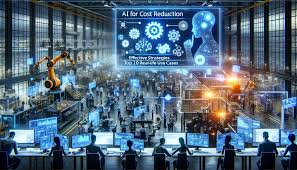
Dubai, recognized globally as a leading business hub, is rapidly evolving into a center for innovation and technology. The logistics and supply chain industry, which forms the backbone of Dubai’s economy, is no exception. Artificial Intelligence (AI) is playing an increasingly critical role in optimizing supply chain operations in Dubai, revolutionizing how businesses manage inventory, logistics, and customer interactions. This blog explores the role of AI in transforming Dubai’s supply chain landscape and its impact on efficiency, cost savings, and long-term growth.
The Growing Importance of AI in Dubai’s Supply Chain
As a global trade and logistics hub, Dubai is at the crossroads of international commerce, connecting East and West through one of the busiest ports and airports in the world. With a rapidly growing e-commerce sector, a thriving manufacturing base, and a diverse business environment, supply chain operations in Dubai must be both efficient and flexible to meet the increasing demands of customers and businesses.
AI is emerging as a game changer for Dubai’s supply chain sector, offering solutions that help businesses improve performance, reduce costs, and gain a competitive edge. By harnessing the power of AI technologies such as machine learning, predictive analytics, and automation, businesses can streamline processes, enhance decision-making, and future-proof their supply chains.
Key Areas Where AI is Optimizing Dubai’s Supply Chain Operations
1. Inventory Management and Demand Forecasting
Effective inventory management is critical to the smooth functioning of any supply chain. AI helps businesses in Dubai optimize their inventory levels, ensuring that they have just the right amount of stock to meet customer demand without overstocking. AI algorithms can analyze historical data, customer purchasing patterns, and external factors such as market trends or seasonal changes to predict demand more accurately.
In Dubai, where retail and e-commerce industries are booming, this predictive power is invaluable. For instance, AI-driven demand forecasting helps businesses avoid stockouts and excess inventory, thus saving on storage costs and preventing lost sales opportunities. AI also enables dynamic pricing strategies based on demand fluctuations, making supply chains more adaptable and profitable.
2. Route Optimization and Logistics Management
Dubai’s strategic location at the crossroads of international trade makes efficient logistics operations a necessity. AI plays a crucial role in optimizing logistics networks by analyzing real-time data and improving route planning for shipments. AI-powered systems can consider various factors such as traffic, weather conditions, fuel costs, and delivery deadlines to suggest the most efficient routes for transportation.
For example, AI algorithms used in Dubai’s port and airport facilities can track cargo movement and recommend optimal routing for trucks, drones, or ships. This helps minimize delays, reduce fuel consumption, and improve delivery times, ultimately lowering operating costs for logistics companies. Moreover, AI can predict delays, enabling companies to proactively mitigate issues before they impact the supply chain.
3. Automated Warehousing
Dubai’s warehousing industry is increasingly adopting AI-driven automation to streamline operations. Automated systems, powered by AI, are used for tasks such as sorting, picking, packing, and inventory management. Robots and drones, integrated with AI algorithms, can perform repetitive tasks more quickly and accurately than human workers, significantly increasing efficiency.
AI enhances warehouse management systems (WMS), allowing for real-time tracking of inventory and improved stock replenishment. In Dubai, where the demand for warehousing is growing alongside e-commerce, automation is essential to keep up with the volume of goods moving through distribution centers. These technologies help businesses maintain efficient warehouse operations, reduce human error, and speed up order fulfillment.
4. Supply Chain Visibility and Real-Time Tracking
One of the most significant challenges in supply chain management is maintaining visibility across the entire network. AI technologies such as machine learning and data analytics provide real-time tracking capabilities that help businesses gain full transparency into every aspect of their supply chains. In Dubai’s bustling trade and logistics environment, where multiple stakeholders and complex processes are involved, this visibility is crucial for success.
AI-enabled platforms offer businesses and customers the ability to track shipments, monitor inventory levels, and provide predictive insights into delivery times. With real-time data, companies in Dubai can quickly identify any disruptions in the supply chain and make necessary adjustments, leading to improved customer satisfaction and smoother operations.
5. Predictive Maintenance and Equipment Management
In a busy supply chain environment like Dubai’s, any downtime in critical equipment—such as trucks, cranes, and warehouse machinery—can lead to significant delays and increased operational costs. AI-driven predictive maintenance helps businesses avoid unexpected breakdowns by monitoring the condition of machinery and forecasting when maintenance is needed.
Using sensors and data analysis, AI algorithms can predict when a piece of equipment is likely to fail or require servicing, allowing businesses to schedule maintenance proactively. This minimizes downtime, reduces repair costs, and improves the overall efficiency of operations. In Dubai’s highly competitive logistics sector, predictive maintenance ensures that supply chain activities are running smoothly and on schedule.
6. AI in Risk Management and Supply Chain Resilience
Supply chains are vulnerable to a wide range of risks, including disruptions from natural disasters, political instability, or economic shifts. AI plays a vital role in enhancing the resilience of Dubai’s supply chains by predicting potential risks and suggesting mitigation strategies.
By analyzing vast amounts of historical data, weather patterns, geopolitical trends, and other external factors, AI can provide businesses with insights into possible disruptions. This allows supply chain managers in Dubai to prepare in advance and devise contingency plans to minimize the impact of unforeseen events. AI-powered risk management tools help businesses make data-driven decisions that ensure the continuity of their operations, even in times of uncertainty.
The Future of AI in Dubai’s Supply Chain
The integration of AI into Dubai’s supply chain operations is still in its early stages, but its potential for growth is immense. As AI technologies continue to evolve, businesses can expect even greater levels of optimization, efficiency, and innovation in the years to come.
In the near future, AI will likely be integrated with blockchain to further enhance transparency and security in supply chains. Additionally, the development of 5G networks will enable faster and more reliable communication between AI systems, further improving real-time tracking and decision-making.
Dubai’s government is also actively promoting the adoption of AI across various industries, including logistics, through initiatives like Smart Dubai and the Dubai Artificial Intelligence Strategy. These initiatives aim to foster an environment of technological innovation and support businesses in implementing AI solutions to enhance productivity and competitiveness.
Conclusion
Artificial Intelligence is playing a pivotal role in transforming supply chain operations in Dubai, optimizing everything from inventory management to logistics and risk mitigation. As the city continues to embrace cutting-edge technologies, AI will further enhance the efficiency, flexibility, and resilience of its supply chain networks. Businesses that adopt AI-driven solutions will be better equipped to navigate the complexities of global trade, reduce operational costs, and remain competitive in an increasingly technology-driven world.
For Dubai, AI is not just a tool for optimization; it is a key driver of growth and innovation in its supply chain sector, positioning the city as a global leader in smart logistics and trade.

